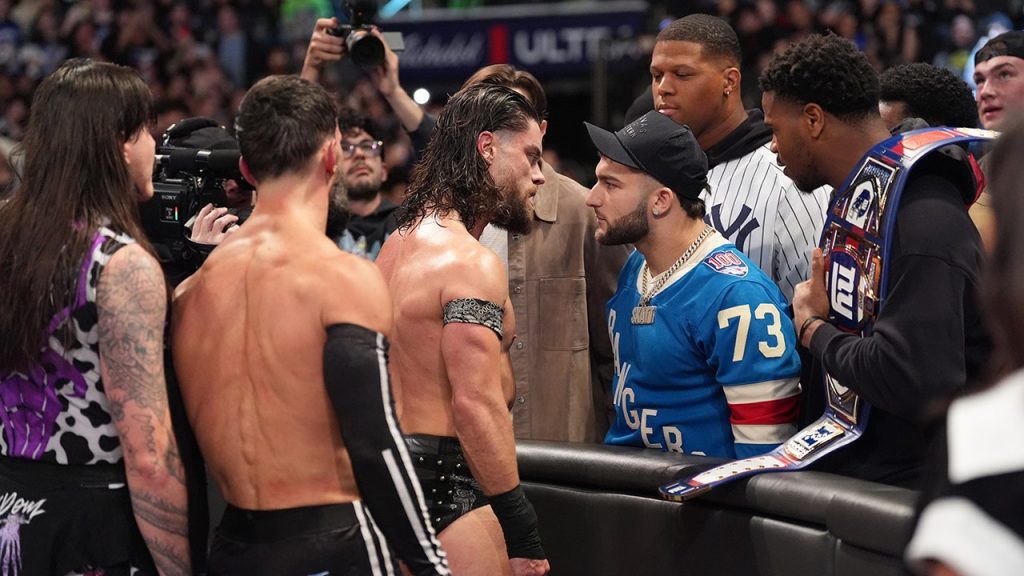Giants Rookie Cam Skattebo Defends His Post-Injury Activities Following WWE Incident
In a candid social media post on Tuesday, New York Giants rookie running back Cam Skattebo addressed the controversy surrounding his recent altercation with WWE stars during “Monday Night Raw” at Madison Square Garden. The injured player found himself at the center of criticism after engaging in a shoving match with professional wrestlers while he’s sidelined from football duties. “If you don’t like that I’m having a good time while dealing with a tough time, then just go ahead and unfollow and casually move on,” Skattebo wrote on X, formerly Twitter. His message reflected the frustration of a young athlete trying to navigate life outside the sport that has defined him. “I’m not able to play football and have the fun I’ve been having my whole life, so I am doing things outside the box trying to find stuff to keep me happy,” he continued, concluding with a request for positivity or silence from his critics.
The incident that sparked this response occurred during a WWE event where Skattebo was in attendance alongside other Giants teammates, including first-round rookie Abdul Carter. What began as typical wrestling entertainment quickly became personal when wrestler Dominik Mysterio engaged with actor Andrew Schulz and then directed comments toward Skattebo. Mysterio taunted the New York audience about the city’s championship drought, then specifically challenged Skattebo, asking, “Can you count, Cam? How many years? He don’t know. He can’t count.” This personal jab appeared to touch a nerve with the sidelined rookie, who is undoubtedly already dealing with the disappointment of his season-ending ankle injury suffered against the Philadelphia Eagles in Week 8.
The situation escalated when another WWE performer, JD McDonagh, began mocking the Giants’ defensive struggles this season before turning his attention directly to Skattebo with the provocative question, “What are you gonna do?” The rookie’s response was immediate and physical – he shoved McDonagh to the ground, triggering a brief scuffle that required security intervention. While such confrontations are often choreographed in professional wrestling, the genuine frustration on Skattebo’s part seemed evident, reflecting perhaps both his personal rehabilitation struggles and the collective disappointment of being part of a team with a dismal 2-9 record.
The criticism Skattebo received afterward highlighted the complicated expectations placed on injured professional athletes. Many fans and commentators questioned the wisdom of a player who should be focusing on rehabilitation putting himself in a position where further injury could occur. Others saw it as unprofessional for a rookie to draw negative attention while his team continues to struggle. However, such perspectives might overlook the human element of injury recovery – the isolation, identity crisis, and emotional toll that comes with being suddenly removed from one’s primary passion and profession, especially for a young player just beginning his NFL journey.
Before his ankle injury sidelined him for the remainder of his debut season, Skattebo had shown considerable promise, accumulating 617 scrimmage yards (410 rushing, 207 receiving) and seven total touchdowns across eight games. These statistics represent not just numbers on a page but the foundation of a career and identity that the rookie has worked his entire life to build. When injury suddenly removes an athlete from their sport, particularly in a rookie season, the psychological adjustment can be as challenging as the physical rehabilitation. Skattebo’s presence at the WWE event and his reaction to being taunted might be better understood within this context – a young man searching for engagement, excitement, and social connection while navigating the unfamiliar territory of serious injury.
The incident also reflects the complex relationship between professional sports and entertainment. With Giants rookie Abdul Carter visibly sporting a custom Giants WWE championship belt at the event, the lines between athletic competition and entertainment spectacle were already blurred before any confrontation began. For young athletes who have grown up in an era where sports and entertainment are increasingly intertwined, participating in these crossover moments might seem natural rather than controversial. Skattebo’s message to his critics ultimately asks for understanding that while he may be temporarily unable to express himself on the football field, he’s still navigating his identity as both a professional athlete and a young adult finding his way through an unexpected challenge. His request for people to either support him or simply “move on” without negative commentary speaks to his desire to manage this difficult period on his own terms.


